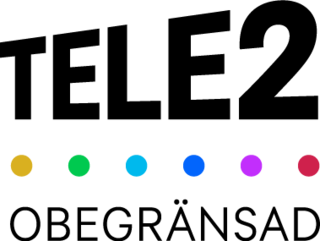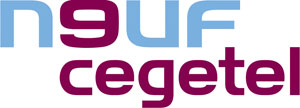History
In 1999, the Portuguese fixed-line telephone market was set to be deregulated, ending the monopoly of Portugal Telecom, which prompted Sonaecom, then mainly a mobile phone operator through its brand Optimus, to enter that market. Clix was launched on October 27 of that year as a residential Internet Service Provider (ISP), together with sister brand Novis (fixed-line telephone service and business ISP). Both brands were supported on the merger of Sonae Redes de Dados (IT consultancy and network management) with IP Global, an ISP which had been acquired earlier in the same year. The initial service offer of Clix consisted of Freeserve-type free Internet access, collecting a proportion of the standard telephone line charges, by analog modem or ISDN, and an advertising-supported web portal. The launch slogan was "fazer clix custa nix" (a wordplay on "to click/Clix costs nothing").
On 7 September 2002 Clix launched an ADSL Internet access service, as Clix Turbo. That service was withdrawn on 20 January 2004 under allegations of anti-competitive practices by Portugal Telecom, the simultaneous supplier of the service and a competitor on its own. Sonaecom then entered a strategy of building its own alternative network, to be fully independent from Portugal Telecom.
On 6 March 2004 the Novis and Clix brands were repositioned. Clix became a residential brand, offering fixed-line phone services for the first time. The relaunch campaign was named Revolução das Flores (flower revolution, a reference to the Clix logo and to the Carnation Revolution). The Clix service offer consisted of a 1 Mbit/s Internet ADSL connection and a telephone service without line rental. It was initially available in some areas of Lisbon and Oporto.
In November 2004, Clix launched new telephone and ADSL Internet access services, with transfer rates of 2, 4, and 8 Mbit/s. On 13 April 2005 Clix launched a 16 Mbit/s ADSL2+ Internet access offer, upgraded to 20 Mbit/s in 2006. As of December 2006, after periodical changes, Clix supplied two offers: 12 and 24 Mbit/s.
In April 2006 Clix made a soft launch of the SmarTV (IPTV) service, offering Digital Television and Video on demand over the ADSL/ADSL2+ Internet access services, which by this date were available to 50% of the population of Portugal. In 2009 it was renamed Clix TV.
In September 2008 Clix launch Clix Fibra, an FTTH based service offering Internet (up to 100Mbit/s), telephone and IPTV services.
In January 2010 Clix was renamed Optimus Clix.
In February 2013 it merged with ZON and was renamed to NOS.

Telecommunications infrastructure in South Africa provides modern and efficient service to urban areas, including cellular and internet services. The Independent Communications Authority of South Africa (ICASA) is the watchdog of the telecommunications in the country.
Telkom SA SOC Limited is a South African wireline and wireless telecommunications provider, operating in more than 38 countries across the African continent. Telkom is majority state-owned (55.3%) with the South African government owning 40.5% of Telkom, while another 14.8% is owned by another state-owned company - the Public Investment Corporation (PIC), which is closely linked to the South African government.

Internet Protocol television (IPTV) is the delivery of television content over Internet Protocol (IP) networks. This is in contrast to delivery through traditional terrestrial, satellite, and cable television formats. Unlike downloaded media, IPTV offers the ability to stream the source media continuously. As a result, a client media player can begin playing the content almost immediately. This is known as streaming media.
A naked DSL, also known as standalone or dry loop DSL, is a digital subscriber line (DSL) without a PSTN service — or the associated dial tone. In other words, only a standalone DSL Internet service is provided on the local loop.

Tele2 AB is a provider of mobile and fixed connectivity, telephony, data network services, TV, streaming and global Internet of Things services, amongst others, to consumers and enterprises. It is headquartered in Kista Science City, Stockholm, Sweden. It is a major mobile network operator in Sweden, Estonia, Latvia and Lithuania.

Optimus Comunicações, S.A. was a Portuguese GSM/UMTS/LTE mobile operator. As of 16 May 2014, Optimus was merged with ZON Multimédia and formed a new company called NOS. Optimus was a wholly owned subsidiary of Sonaecom.

Embarq Corporation was the largest independent local exchange carrier in the United States, serving customers in 18 states and providing local, long-distance, high-speed data and wireless services to residential and business customers. It had been formerly the local telephone division (LTD) of Sprint Nextel until 2006, when it was spun off as an independent company. Embarq produced more than $6 billion in revenues annually, and had approximately 18,000 employees. It was based in Overland Park, Kansas.

Free is a French telecommunications company, subsidiary of Iliad that provides voice, video, data, and Internet telecommunications to consumers in France. Its head office is in the 8th arrondissement of Paris and it is the second-largest ISP in France.
Vodafone Portugal – Comunicações Pessoais, S.A., a full subsidiary of the Vodafone Group, is the second mobile operator in Portugal, both chronologically and in market share. Its competitors are NOS and Meo.

NOS, SGPS S.A. is a Portuguese telecommunications and media company who provides mobile and fixed telephony, cable television, satellite television and internet. The company resulted from the merger in 2013 of two of the country's major telecommunications companies: Zon Multimédia and Sonae's Optimus Telecommunications.
Whidbey Telecom is a private, independent telecommunications company operating on the South End of Whidbey Island in Washington State, the community of Point Roberts, Washington, and its affiliate Hat Island Telephone Company on Hat (Gedney) Island. Whidbey Telecom has been locally owned and operated since it started business in 1908.
ONO was a Spanish broadband communication and entertainment company, delivering integrated telephone, television and Internet services to its residential customers. In this segment, it has 3.7 million services contracted and over six million users.

Neuf Cegetel was a French wireline telecommunications service provider and a mobile virtual network operator (MVNO). It offered various telecommunications services to consumers, enterprises and wholesale customers, ranking second in the country in annual revenues. It was legally established in 2005 following the completion of the merger between Neuf Telecom and Cegetel. As of June 2008, the company became a wholly owned subsidiary of SFR, and the brand disappeared commercially.
Internet access is widely available in New Zealand, with 94% of New Zealanders having access to the internet as of January 2021. It first became accessible to university students in the country in 1989. As of June 2018, there are 1,867,000 broadband connections, of which 1,524,000 are residential and 361,000 are business or government.

MEO is a mobile and fixed telecommunications service and brand from Altice Portugal, managed by MEO - Serviços de Comunicações e Multimédia. The service was piloted in Lisbon in 2006 and was later extended to Porto and Castelo Branco.
The prevalent means of connecting to the Internet in Germany is DSL, introduced by Deutsche Telekom in 1999. Other technologies such as Cable, FTTH and FTTB (fiber), Satellite, UMTS/HSDPA (mobile) and LTE are available as alternatives.
Malta has been involved with the Internet since the latter's early days.
Internet in France has been available to the general public since 1994, but widespread Internet use did not take off until the mid-2000s. As of 31 December 2014, France had 26 million Internet broadband and high-speed connections on fixed networks. In 2014, 80.7% of French households had Internet access, while 19.3% did not.
The Internet in Portugal achieved a penetration rate of about 64% of the population in 2012. With an average peak Internet access speed of 34.5 megabits per second, Portugal stood seventeenth on the list of countries with the fastest Internet access.

Hellas Online was one of the leading Greek fixed-line telephony service providers based in Athens. Founded in 1993, Hellas Online (hol) was one of the first Internet service providers in Greece offering public dial-up Internet access. It evolved from an ISP to a fixed-line telecommunications services provider offering a broad range of retail, business and wholesale services. Since 2006 it became a member of the Intracom Holdings group. Before its dissolution, following its merger, with Vodafone in 2014, it had 531,563 LLU subscribers.










